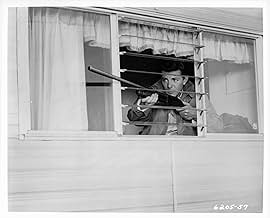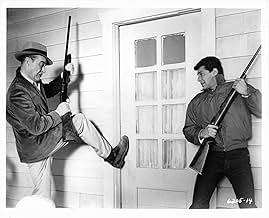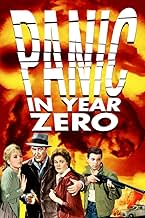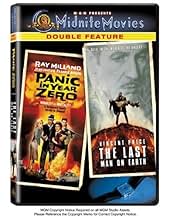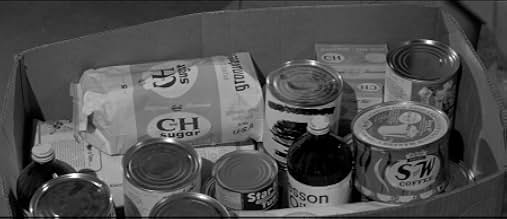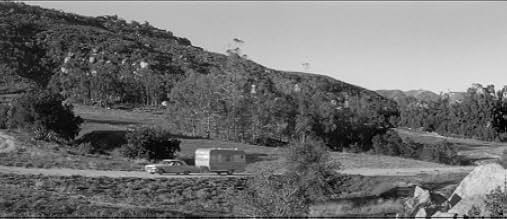Miracolosamente scampata alla distruzione nucleare di Los Angeles, la famiglia Baldwin deve organizzarsi per sopravvivere in una situazione dove i superstiti se ne infischiano della legge, a... Leggi tuttoMiracolosamente scampata alla distruzione nucleare di Los Angeles, la famiglia Baldwin deve organizzarsi per sopravvivere in una situazione dove i superstiti se ne infischiano della legge, abbandonandosi ad ogni sorta di violenze.Miracolosamente scampata alla distruzione nucleare di Los Angeles, la famiglia Baldwin deve organizzarsi per sopravvivere in una situazione dove i superstiti se ne infischiano della legge, abbandonandosi ad ogni sorta di violenze.
- Andy
- (as Neil Nephew)
- Roadside Diner Customer
- (non citato nei titoli originali)
- Radio Announcer
- (voce)
- (non citato nei titoli originali)
- Looter
- (non citato nei titoli originali)
Recensioni in evidenza
Milland and his family set off on a weekend camping/fishing trip and a flash in the distance they think at first is lightning turns out to be an atomic mushroom cloud over Los Angeles. The rest of the film they attempt to survive and maintain some resemblance of civilized behavior while rationalizing their lapses into violence against the panic-stricken populace, looters, and opportunists who suddenly appear. It might easily have been handled as the exploitation film promised by the trailer (it's an American International production, after all), but is actually a very thoughtful and well-structured meditation on how people might react in the event of the massive nuclear attack everyone was fearing at the time.
The theme of nuclear apocalypse was most common in the early 1960s, when relations between the United States and the Soviet Union were at their most hostile. Some films, such as Kubrick's 'Dr. Strangelove (1964)' and Lumet's 'Fail-Safe (1964),' chronicled the events leading up to such an incident, whereas Kramer's 'On the Beach (1959)' took place in the following months. What these big-budget offerings have in common is that they focus primarily on the big-players in the Cold War, particularly the government and military officials. 'Panic in Year Year!' deals, out of budgetary necessity more than anything else, with ordinary people in an unfathomable situation, and is all the better for it. When Harry Baldwin (Milland) takes his family on a fishing trip, the sudden flash of light emanating from Los Angeles is initially mistaken for lightning, followed by the mundane remark that "I hope it doesn't rain." The Baldwins are a regular American family who don't deserve to have their lives and lifestyles exploited like cheap pawns in a game of chess.
It's interesting that the charming rogues of the 1940s, such as Ray Milland and George Sanders, turned into convincing family-orientated men during their autumn years of acting. Milland is excellent in the main role, a dedicated father and husband who, in his determination to persevere, finds himself abandoning the very civilised morals for which he is fighting. Despite creating a strong sense of the chaos and lawlessness that accompanies a national catastrophe, the film's message is still an overwhelingly positive one: that the bonds of family and friendship are a crucial necessity in difficult times. There are, of course, a few unlikely plot turns by coincidence, the two groups of people who seek refuge in the Baldwins' hideaway are the very two with whom the family had had previously altercations and the occasional moment that can only be described as B-movie silliness {my favourite is the announcement that the sole outcome of an urgent United Nations meeting was to give this year a dramatic-sounding name}. Even so, 'Panic in Year Zero!' is a gripping and unforgettable addition to the science-fiction genre.
Despite the insipid nuclear holocaust effects (looks more like a thunderstorm), this is a surprisingly effective movie. Milland elicits effective performances from each and every member of his cast (Frankie Avalon has never been better). The menace, humiliation and sheer terror of rape has never been more poignantly depicted on the screen, and all without nudity. A minor classic.
Lo sapevi?
- QuizWhen the family is in the car at the beginning of the film and suspect something is happening, they cannot pick up any "CONELRAD" stations on the car's radio. CONELRAD (COntrol of ELectromagnetic RAdiation), established in 1951, was the first nationwide system for emergency broadcasts in the United States. All radios made between 1953 and 1963 were required to have marks on the AM dial at 640 and 1240 MHz where citizens were expected to tune to obtain civil defense information. CONELRAD was succeeded by the Emergency Broadcast System in 1963 (which did not use dedicated frequencies) and it, in turn, was replaced by the Emergency Alert System in 1997.
- BlooperIn the scene where the bridge is pulled down, to the left you can see bushes and the bridge pilings being pulled quickly in the opposite direction.
- Citazioni
Dr. Powell Strong: Now, you stay on the back roads. And you keep your gun handy. Our country is still full of thieving, murdering... "patriots."
- Curiosità sui creditiOther than the title, all credits are at the end of the movie.
- ConnessioniFeatured in Aweful Movies with Deadly Earnest: Panic in the Year Zero (1969)
I più visti
- How long is Panic in Year Zero!?Powered by Alexa
Dettagli
- Data di uscita
- Paese di origine
- Lingua
- Celebre anche come
- ¿Habrá otro mañana?
- Luoghi delle riprese
- Azienda produttrice
- Vedi altri crediti dell’azienda su IMDbPro
Botteghino
- Budget
- 225.000 USD (previsto)
- Tempo di esecuzione1 ora 33 minuti
- Colore
- Mix di suoni
- Proporzioni
- 2.35 : 1
Contribuisci a questa pagina



